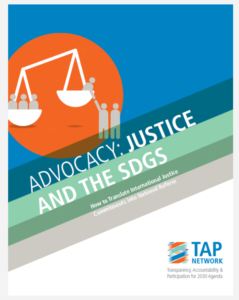Advocacy: Justice and the SDGs
By: TAP Network
Advocacy: Justice and the SDGs is a toolkit is for civil society, activists, and policy practitioners who are working to promote legal empowerment and access to justice.
From now until 2030, governments will be working to achieve the SDGs and Goal 16’s promise to provide “access to justice for all”. The SDGs provide a tactically strong way to advocate for much-needed justice reforms that will benefit the poor, marginalized, and excluded.
This toolkit will teach you everything you need to know to enable you to initiate the creation of a national justice plan for your country. It provides a step by step guide to steer you through the entire process: from broadening your understanding of the SDGs and how they can help your advocacy, to how you can hold your government accountable to the justice commitments it has made.
This toolkit is a complementary resource to the TAP Network Goal 16 Advocacy Toolkit, which provides civil society and other non-governmental stakeholders with guidance on how to engage with their governments and other local, regional or international stakeholders to support the planning, implementation, follow-up and accountability of Goal 16 more broadly.
Some of this toolkit’s key highlights include:
CONTEXT
• Become familiar with the SDGs and learn why legal empowerment and access to justice are essential to their overall success
• Understand how you can use the SDGs to advocate for a national justice plan
• Identify ways you can help hold your government accountable to its
international justice commitments
TOOLS
• Access to Justice Assessment: Identify your country’s key justice issues
• Gap Analysis: Determine what your government is currently doing to address these issues
• Solution Tree: Pinpoint solutions to tackle and resolve these issues
PRACTICAL APPLICATIONS
• Case studies demonstrating successful advocacy efforts that use the
SDGs to achieve national justice reforms
• Case studies highlighting various strategies CSOs and governments have successfully used to promote legal empowerment and increase access to justice

